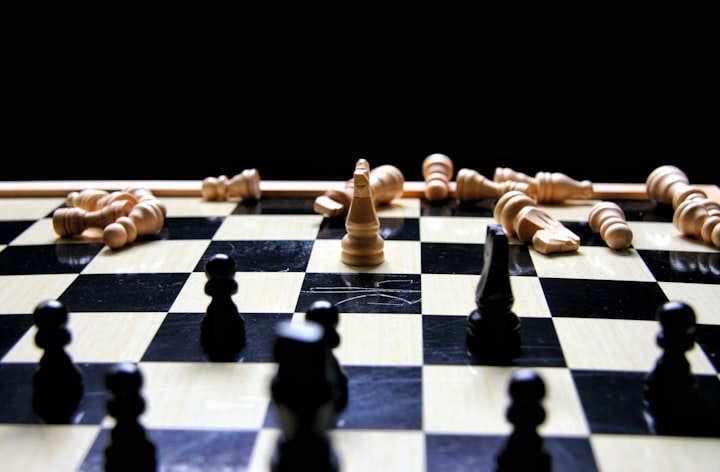
From the age of seven, I played chess continually and seriously. I played in school, on the web, at public rivalries. Chess showed me persistence, constancy, decisive reasoning - pivotal abilities for handling life's difficult issues and tough spots.
Chess wired me to think causally at a youthful age. Move your knight here; you'll trap his cleric. Catch that pawn; you'll debilitate his right side. Each right draw drove me nearer to a checkmate; each misleading advance carried me nearer to overcome.
Chess additionally presented the possibility of the "other". Dark versus white. Our school versus theirs. Also, every game was lose-lose - there was just ever one highlight score, either to be shared or taken completely. No real way to develop the pie.
I played chess genuinely until the age of fifteen, around the time I got my first wireless. The cell was a critical characteristic of opportunity for a young person, despite the fact that it needed genuine utility. I recall it well - a little flip telephone with a shading screen. I conveyed it wherever with me as an image of my freedom. My telephone couldn't get to the web or send a Snapchat, however I observed it could kill fatigue with its one included game: Tetris. What's more, I became dependent.
Tetris, to some, is dissatisfaction in essence. It's monotonous! It's difficult to win! It's driven by karma! Be that as it may, as far as I might be concerned, it turned into the most genuine portrayal of life there is. In examination, chess is only a senseless conflict game.
I don't play chess seriously any longer. Yet, right up 'til today, Tetris is the main game on my telephone. It sits on the first page of my applications, a consistent update that life is Tetris, not chess.
I'll make this qualification clear in four straightforward focuses. Perhaps you've been playing the game wrong as well.
1. Throughout everyday life, your main rival is yourself.
I grew up searching for rivals - individuals to battle, individuals to fault, individuals to disprove. I envisioned adversaries when there were none since battling was simple. I dealt with all that like it was lose-lose when there was so much else to acquire.
That is the chess outlook. Also, it keeps you down.
In Tetris, you're just playing against time and the ceaseless progression of pieces through and through. The attitude is inside centered - you are provoking yourself to maneuver an irregular stream of contributions toward a methodical design accurately. There's no last chief. No fault to appoint.
The genuine round of life is totally inner. There truly are no huge, terrible adversaries who exist to make you endure. There is no outright set in stone move that a specific rival can rebuff. What's more, your score can increment to boundlessness, in the event that you simply propel yourself harder. Your life score can increment gradually or rapidly, contingent upon how hard you propel yourself. Which carries me to…
2. Throughout everyday life, things don't get more earnestly - they simply get quicker.
A few games get more earnestly the more you play, including chess. Positions get more convoluted, rivals become really testing, the stakes increment. You have a public rating, and hence more to lose when you play similar rivals.
Not Tetris. The game continues as before from Piece One until you run out of space on the screen. The main thing that changes is the speed.
Assuming you played Tetris at the slowest conceivable speed for the remainder of your life, you might actually never lose. The main adversary would be exhaustion. Yet, the calculation for beating Tetris isn't confounded, and you have a lot of opportunity to move the parts of their ideal areas.
In Tetris, generally, we challenge ourselves. We are not satisfied with basically making each column in turn. We drive ourselves to get a Tetris - four lines at the same time. It's the situation. What is the point of playing on the off chance that you don't take the plunge?
I dealt with life like chess for quite a while - a progression of steadily expanding difficulties. I would develop issues where none were required and take on a casualty outlook. Be that as it may, life doesn't really get more diligently the more you play. As we age, we have more cash and more insight. Our freedom increments. We don't need to take on new difficulties on the off chance that we don't wish to. Be that as it may, we look for satisfaction, so we regularly do.
In any case, life gets quicker. Consistently we live is a more modest level of our complete life, and we see time as moving all the more rapidly. Our obligations develop until undertakings we ought to genuinely appreciate are treated as inconveniences or thoughtless interruptions.
The best way to dominate life - like Tetris - is to figure out how to play with similar poise at the most noteworthy velocities. You can't permit your objectives to be compromised, regardless of the speed at which you move. You should control your own psyche, your own ways of behaving, and your own time. Which drives us to…
3. Throughout everyday life, you have zero control over the board.
As I referenced before, chess is causal. There is a "best move" for some random position. You can drive your adversary into a corner. You can see twenty maneuvers into the future, on the off chance that you're a supercomputer.
Chess accompanies a bunch of solutions and best practices. 1. e4 is viewed as a solid opening move for white. 1. h3 isn't. That is on the grounds that chess is a shut framework. There's no irregular limitations, no blind chance. The pieces generally move something very similar, and the it is generally indistinguishable from start position.
Tetris? You just know what the following piece is. You play for the current second, attempting to build the most ideal arrangement of pieces, realizing that it is difficult to foresee what is happening even two pieces from now. You don't get tricked into figuring you have some control over what's to come.
I consumed a lot of my time on earth in that chess outlook, attempting to track down the most ideal play or power my direction toward a foreordained end. I was permanently set up to see causality surrounding me and to look for control.
In any case, genuine isn't causal. There is generally a dispersion of potential occasions. Things happen that are one out of many. There is no immediate, unsurprising reaction to our activities. Our lives are open frameworks, where quite a few undetectable occasions can really impact our viewpoints and viewpoints in minutes. Indeed, even life's greatest choices are not really measurable - that is the reason loads of relationships end in separate.
Try not to attempt to think about which parts are coming when you attempt to advance your circumstance. Like Tetris, you can just set yourself in the most ideal situation without trying to totally control the framework you play in. Definitely, control and challenge yourself - genuinely, go for that Tetris - however expect no blessings since you did. Furthermore, recall…
4. Throughout everyday life, nobody lets you know when you've won.
In chess, you'll get to see your rival tip over his ruler in acquiescence. You'll see the last competition scores posted. You'll feel the fulfillment of triumph - except if, at some point, you don't.
I recollect the day I quit chess. I didn't get pounded and give in disappointment. I won a competition, as a matter of fact. Also, subsequently, I didn't feel anything.
As per the centuries old principles of chess, there's just two methods for losing - get checkmated, or leave. The day I quit chess, I concocted another. In the event that I wasn't learning, on the off chance that I wasn't partaking in the battles or triumphs, I had proactively lost.
The choice to stop was freeing, unnerving, and befuddling. For what reason did I feel so free when I had surrendered one of my first loves? Yet, stopping felt better for the explanation that beginning to play chess felt directly in any case - it was totally my decision to do as such. Furthermore, with that choice, my cutthroat, causal chess outlook started to debilitate, and my viewpoint at long last cleared.
In the mean time, Tetris started to make up for my gaming shortfall. I play Tetris consistently, and consistently I get the game realizing that I will lose. How long will I play before I lose? How quick will the pieces go? What amount will I score? Those are the measurements the game tracks. However, I added a method for winning - on the off chance that I play Tetris consistently.
I appreciate being solid in laying out objectives for myself. I get extraordinary fulfillment from realizing that I can consistently set myself an individual test and assault it day to day. Whether I achieve what I set off to accomplish, just I know.
Playing Tetris consistently constructs my assurance, my concentration, my will to persist at things I know have no end. Also, I don't play to win - I play to play.
We ought to all play life to play. We shouldn't just see our adversaries or try to control.
We should comprehend that this is just an issue of viewpoint. Chess can be a forlorn game - yet so can Tetris. Both require persistence and assurance. Both require a receptive outlook.





Comments
There are no comments for this story
Be the first to respond and start the conversation.